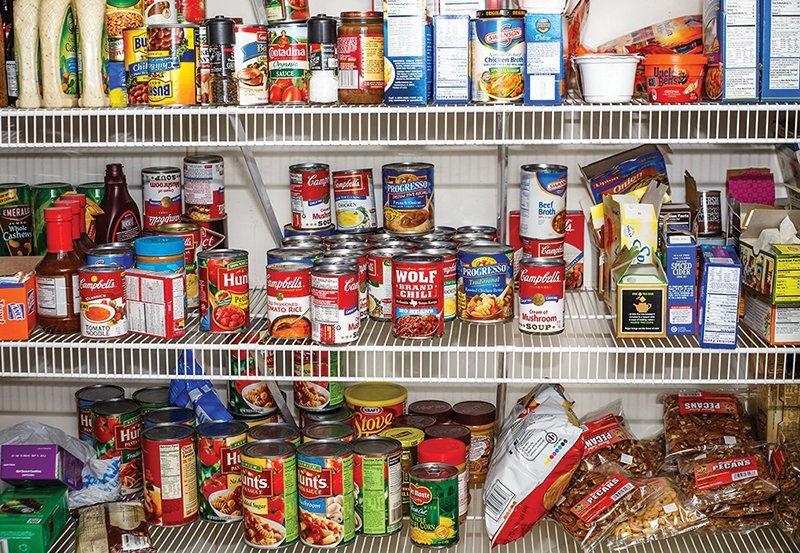
Summertime is a lean time at the eight Emergency Assistance Center food pantries operated by Catholic Charities of Northeast Kansas. The demand for food goes up in the summer at the same time that giving drops off.
by Joe Bollig
joe.bollig@theleaven.org
KANSAS CITY, Kan. — They don’t plan to close their doors, but those shelves are getting mighty bare.
Summertime is a lean time at the eight Emergency Assistance Center food pantries operated by Catholic Charities of Northeast Kansas. This summer is no exception.
“Our donations during the school year keep up with demand. But when the demand goes up at the same time donations tend to decrease, we have bigger gap,” said Denise Ogilvie, vice president of outreach and grants management at Catholic Charities.
“We have a saying around here: schools out — food’s out,” she said.
Catholic Charities food pantries, like all others, get their food from several sources.
A lot of the food that fills pantry shelves comes from food drives conducted by parishes and schools. Catholic Charities also has partnerships with certain grocery stores that donate items slightly past their expiration date but still good.
Harvesters, a nonprofit regional food bank, is also a source of food.
But when schools let out in May, the collections stop. Parishes continue food drives, but many families go on vacations and the donation rate declines.
On the recipients’ end, however, once schools are closed, families whose children would normally participate in free or reduced cost school lunch programs now bear the cost of making up those additional meals without help.
Catholic Charities tries to help them bridge that gap.
“We’re trying to keep our food pantry shelves stocked, and we do that in different ways,” said Ogilvie.
“We get donations of fresh produce more in the summer,” she continued. “We ask people to take fresh food rather than canned. We are also able to purchase from Harvesters.
“I was at our warehouse [recently], and our warehouse has very little food. It’s going out as fast as it’s coming in, and we don’t have any extra.”
But they’re not giving up.
“We’re not going to close our doors,” she added. “We’re committed to staying open.
“If there’s a parish out there that wants to do a food drive, we’d love to talk to them.”
Sometimes food insecurity is chronic, but sometimes it’s episodic. The pantries are used by people with disabilities, on fixed incomes, the unemployed, single mothers with children out of school and those who need to fill the gap until their paycheck arrives.
“I was at a food pantry [recently] when someone came in who had never been to one of our food pantries before,” said Ogilvie. “This person was a little nervous, this being their first time. The volunteers were so nice and welcoming. She had tears in her eyes. She said, ‘I didn’t know what I was going to do today.’”
In Kansas, one out of every seven people is food insecure — meaning they might not have food for their next meal or are not sure of when they’ll be eating next.
People who want to help can do so in a number of ways.
If you can fill a grocery bag or two, you can drop them off at the nearest Emergency Assistance Center. If you have more, such as from a parish food drive, donors can drop off the food at the Hope Distribution Center, the central warehouse for Catholic Charities pantries in Kansas City, Kansas.
“We can also pick up large stuff, if your neighborhood or parish has a food drive,” said Ogilvie.
For information about food drives and donations, go online to: catholic charitiesks.org, click on “Get involved” at the top of the home page, then “Gifts in kind” in the pull-down menu and, finally, click on “Donate Food or Toiletries.” This page has a short shopping list and instructions.
To host your own food drive, contact Kristen Filardo at (913) 433-2081, or send an email at: ccnekvolunteers@catholiccharitieskc.org.
To drop off food at an Emergency Assistance Center, call Dustin Hardison at (913) 433-2072, or send an email to: dhardison@ccnekvolunteers.org.
The Hope Distribution Center is at 1708 Steele Rd., Kansas City, Kansas. Its hours of operation are 8:30 a.m.- 4:30 p.m., Monday through Friday. Call (913) 432-3141.






